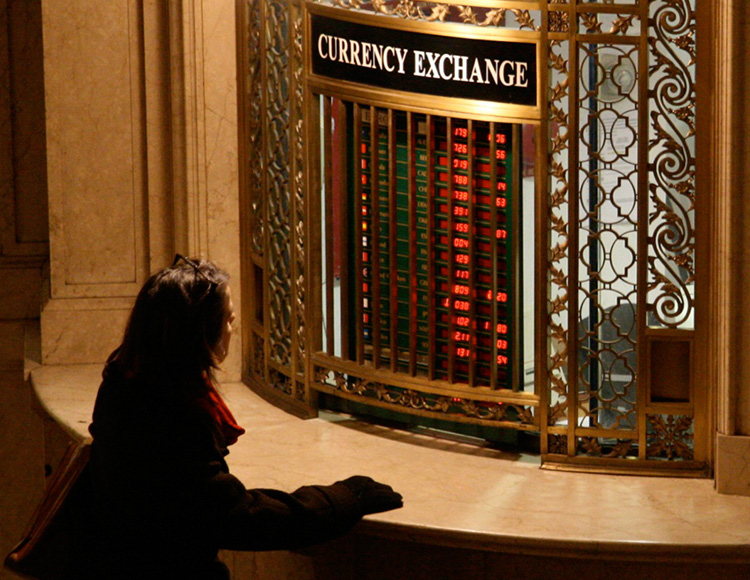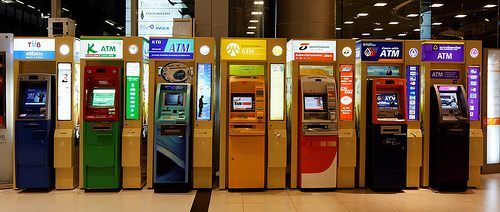The golden rule for travel money is never keep all your eggs (money) in one basket (your bag or wallet). If you get robbed or misplace your stuff, you lose everything. Carry a useful amount of cash for a day hidden somewhere discreet, and leave the rest in a secure spot, like your hotel safe, even if you plan to primarily use a bankcard while abroad. Everyone has his or her own trick for hiding emergency stash. Money belts, secret pockets, a Ziploc bag tucked into the lining of your suitcase, an old film canister in your washbag – after all, when was the last time you heard of somebody stealing a washbag? Here are some more handy tips for how to handle cash when you're on the road:

Exchanging money for foreign currency. Image by Marco Ament / CC BY-SA 2.0
Using cards on the road can have loads of payoffs, and it’s smart to use a mix of these so that you have backup if your primary money goes missing. Credit cards come in handy for making reservations, larger purchases and are excellent in case of emergencies. Debit cards allow you to access your money the same way as you do at home immediately, without the looming credit card bill to come home to after holiday. If your ATM debit card is linked to a major global credit card company, you’ll have no problem making withdrawals in hundreds of countries worldwide. Many card programs also include emergency cash or replacement card services, which can get you out of a tight spot, so it’s important to know how to contact your issuer if the need arises. Many banks and credit card companies now offer prepaid cards, which can be charged as much as you like and used like a debit card. They’re great for sticking to your travel budget, are available in single or multiple currencies and often have the same benefits as debit cards, such as emergency cash and card replacement services. Just be sure to check how easy it is to get any remaining balance back from your card when you return. As an added bonus, most cards offer favourable exchange rates you can lock in before you travel, and you can recharge the card online, by phone or SMS.

Colorful ATM in Paragon, Bangkok, Thailand. Image by Dennis Wong / CC BY-SA 2.0
If you’re using plastic, here are a few simple rules that every traveller should follow:
The global proliferation of ATMs (they even have them high in the Himalayas) has made travellers cheques a less-popular option. They are no longer as widely accepted as they used to be, and changing cheques can involve drawn-out bureaucracy and yards of red tape. However, they do have their advantages: they are accepted by banks and moneychangers all over the world and are easy to replace if lost or stolen. So long as you have the receipts and the emergency phone number, you can get new cheques in a matter of days, though you may have to travel to a local agency to pick them up. Thomas Cook and American Express are the most widely accepted brands, but before you buy cheques, contact the issuer to find out just how widely they are accepted in your chosen destination, and which currency the cheques should be drawn in. When in doubt, carry cheques in US dollars, the unofficial second currency in most of the world. Bring a mix of denominations, keep the receipts separate from the cheques, and save the emergency phone number somewhere safe.
If all other options fail, you could always ask someone to wire you money. Western Union and Moneygram have agents all over the world where you can receive a wire transfer from home, but you pay a premium for the service – sometimes as much as 30% of the transfer amount. Just pray you have an understanding relative!